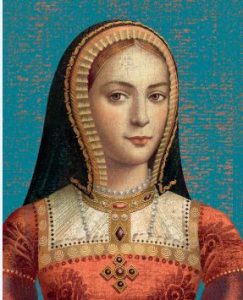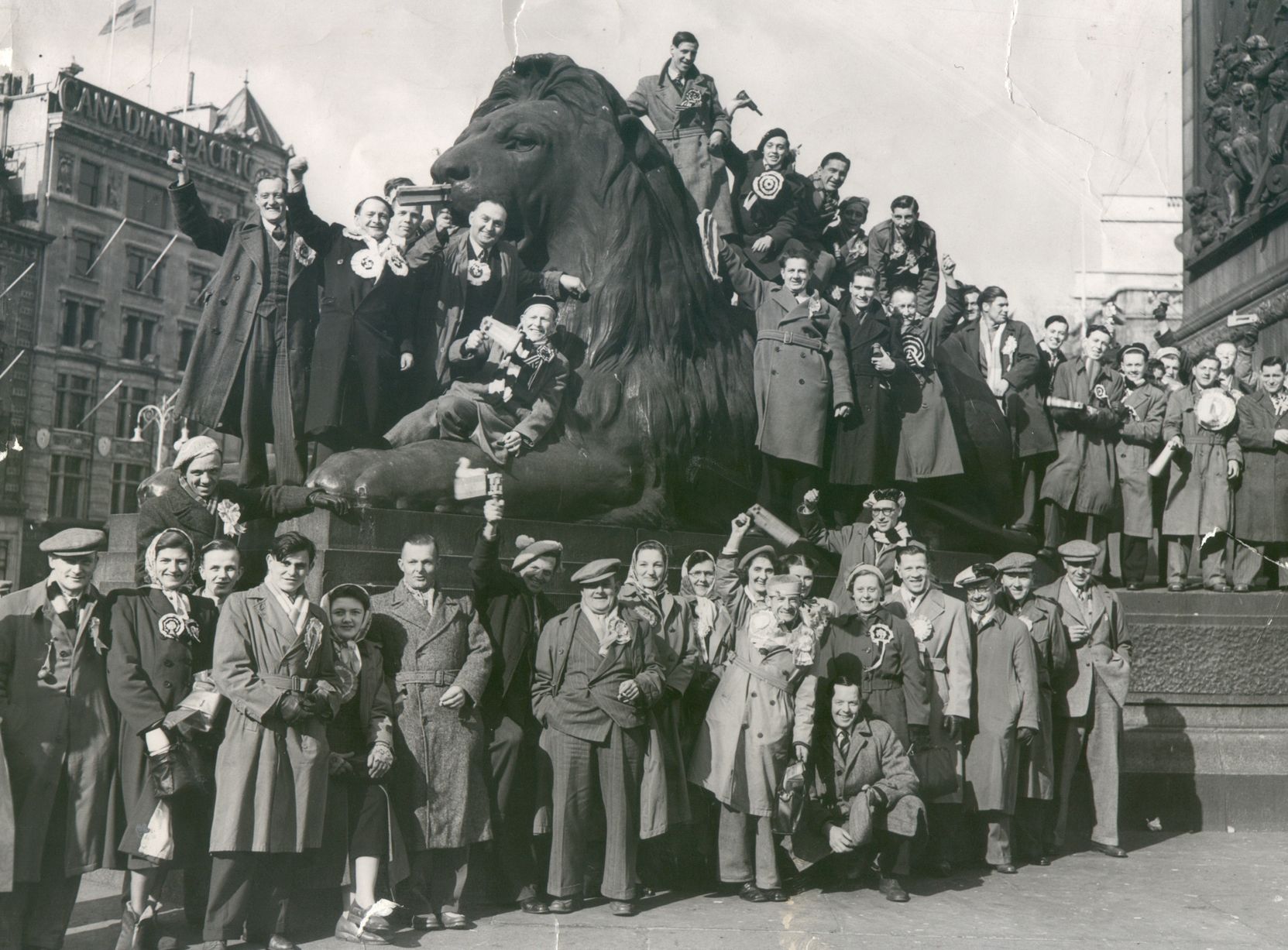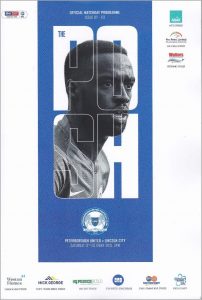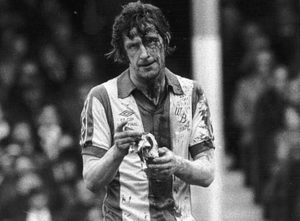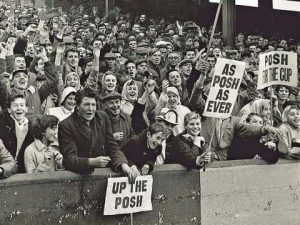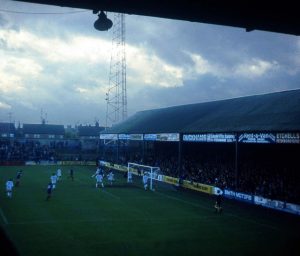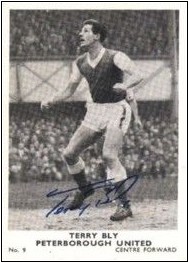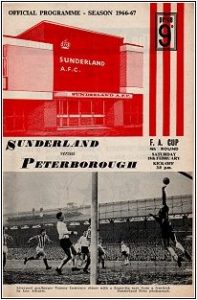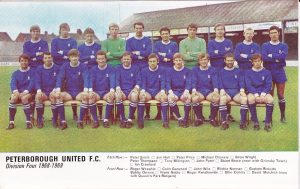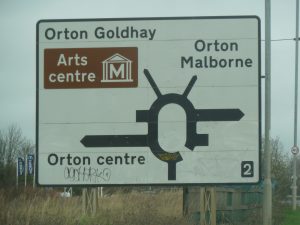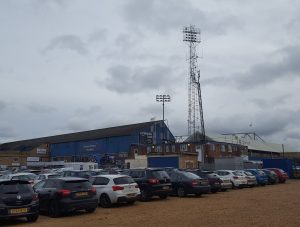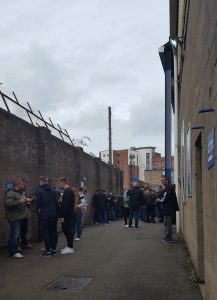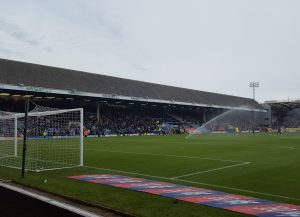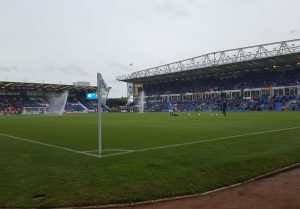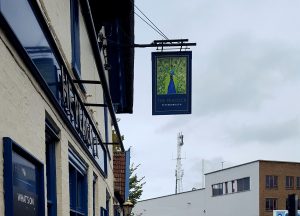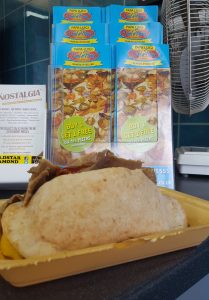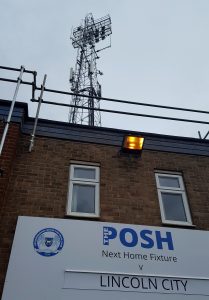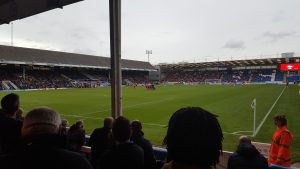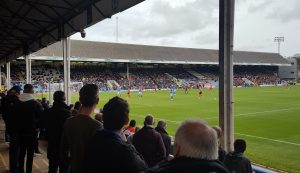Peterborough United 2 Lincoln City 0
League One
Saturday 12 October 2019
The context
For no particular reason London Road was a long-standing gap in my 92. John, meanwhile, was a relative expert on Peterborough football as he’d been once before (an occasion marred somewhat when a cyclist ran over his foot). On my only previous visit to the city I’d been most struck by its chaotic traffic system and by Katherine of Aragon’s simple grave in the Cathedral. Henry VIII’s principled and dignified first wife ended up at nearby Kimbolton following her controversial divorce, but given that Real Zaragoza were her proper team it’s unlikely she ever took much interest in the Posh.
Anyone who saw John Wile in his prime would consider that nickname rather odd. In my experience United teams are generally anything but refined, and in fact until the 1950s they were known as the Brickies in deference to the city’s long-standing clay industry. Railways and brickery defined Peterborough in Victorian times. More recently designation of the surrounding villages as a New Town ensured its modern significance as a shopping centre in the middle of the Fens. It’s all a far cry from the days when Hereward the Wake made such a nuisance of himself that the local monks had to build a castle to keep him out.
The history
If you remember Fantasy Football League then you’ll also recall that in 1957 David Coleman went to Peterborough. The occasion was the run-in to the then Midland League side’s FA Cup Fourth Round tie at First Division Huddersfield. At that time Coleman worked as a local BBC sports editor. His big break on Grandstand was still a year away. Viewers saw him in a series of contrived and twee scenarios where he encountered (among others) manager George Swindin and the team’s bell-ringer mascot. He also enjoyed a stilted meeting with the chairman, Frank Stimson, in his pub The Peacock. Posh had reached that stage via wins over Yeovil, Bradford Park Avenue and Lincoln. The Third Round game against the Imps proved something of a classic as United won a Sincil Bank replay 5-4 following a 1-1 draw at London Road. They bowed out 3-1 in Yorkshire in front of over 10,000 travelling fans, doing their chances of joining the Football League a lot of good in the process.
This was a golden age for Peterborough United. They won five successive Midland League titles from 1956 onwards, and embarked on a war of attrition with the closed shop of the re-election process which ultimately saw them replace Gateshead in the League at the end of 1959-1960. Their bid was helped over the line by yet another Cup run. This one featured victories over Shrewsbury and Ipswich, and culminated in a 2-0 Third Round defeat at Hillsborough. The build up was captured by Pathe and can be viewed here. By this time Swindin had left to manage Arsenal, for whom he’d played nearly 300 times as a goalkeeper. His replacement was Sheffield United stalwart Jimmy Hagan. Under Hagan Posh followed up their election to the League by winning the Fourth Division in their first season – “like a blue and white tornado”, as Ivor Ponting commented in his obituary of prolific goalscorer Terry Bly.
The ground gained its enduring identity during these formative years. In the Coleman film the main North Stand had only just been completed, and the two covered ends (soon extended) were equally new and shiny – the Moys End dating from 1953 and the London Road End from 1954. When the Glebe Road terrace was refurbished in 1957 it meant that a previously nondescript venue had been transformed within four seasons. Floodlights followed in 1960 and then it was three decades before the club felt any great need to embellish it further. That they did so at all was down to the requirement for more seats following the Taylor Report, and their solution was to convert the North Stand paddock and build a new South Stand over the open side terrace. There then followed another long period of stasis which lasted until the Moys End was demolished in 2013.
Peterborough United have undoubtedly had their moments. Bly’s post-War record of 52 League goals in that tumultuous first season is unlikely to be beaten any time soon. But their most singular achievement is to have been relegated despite finishing ninth. It happened in the 1967-68 campaign, when they were investigated for alleged illegal bonuses paid to players. The payments – which seem to have been born of naivety rather than dishonesty – went back as far as 1965-66, but what brought them to light was a Fourth Round FA Cup-tie with Sunderland in early 1967. Posh lost the game 7-1 so don’t appear to have gained much of an advantage.
Nevertheless it was decided – in November 1968 – that the team would be relegated from Division Three at the season’s end, leaving them resentfully playing 27 fixtures merely to keep up appearances. At the same hearing Port Vale and Manchester United were found guilty of arguably worse offences. Vale were expelled from Division Four and duly voted straight back in again, while United were let off with a fine, proving – not for the last time – that the Football League can sometimes move in a mysterious way when a consistent one might be better.
The journey
This was the third time in a week that I’d driven to Birmingham. Luckily Highways England are constantly seeking ways to make the M6 more interesting, and in a new development they’d coned off the last surviving stretch between Keele and Cannock where it was still possible to go faster then 50mph. We were overjoyed to find the section around Coventry also undergoing transformation to a “smart motorway”, and it was a relief when we finally made it onto the more stupid but infinitely less irritating dual carriageway to the East.
Once on the outskirts of Peterborough we knew to follow signs for Orton. Unfortunately there seemed to be dozens of Ortons. We navigated Orton Northgate, avoided Orton Southgate, went between Orton Brimbles and Orton Wistow, had nothing whatsoever to do with Orton Goldhay and Orton Malborne, queued in traffic through Orton Waterville and by the time we saw Orton Longueville were convinced we’d stumbled into an episode of Midsomer Murders. (The Orton thing apparently dates back to the New Town’s creation and a rather unimaginative expansion of the pre-existing Longueville and Waterville. Hello Cully, what are you doing here?)
The ground
We had tickets in the London Road terrace, principally because prices there were cheaper (or strictly speaking less extortionate) than for the seated stands. And it proved to be a well-preserved lower division standing end, of the kind many grounds once had but which nowadays are rarer than hens’ teeth. (Curiously, spacious modern terraces are actually quite uncomfortable to stand on. The crowd used to keep you in place but on the new sort you fall off the steps.) Despite pillars across both the middle and front the view here was surprisingly good. The low roof and boxed-in ends must make it rather cosy in winter.
Peterborough supporters sit down to watch football away from London Road but still enjoy these pretty basic facilities for home games, which to me demonstrates that concourses and fanzones are less important to even younger fans than many would have you believe. And is it really so bad to drink your beer standing under the skies instead of flinging it about inside a concrete cave? There was less pushing and shoving here than in many a modern stadium, despite some massively cramped toilets and exits. And I’d forgotten how amicable it is when groups of friends aren’t forced to converse along a row in Chinese whispers. A lad behind us was completely off his tits, and while his solo singing was amusing for a while it grew tedious after half an hour or so. In an all-seater you’d be stuck with him bellowing down your ear for ninety minutes. Here you can just move.
This end and the main stand have a definite Fifties vibe but elsewhere the spirit of Hagan and Bly is steadily being obliterated. The South Stand on the Glebe Road side is a two-tier effort, tidy and proportionate but uniformly identical to the kind of thing you see at many lower league stadia. It lacks the quirkiness of the old brutalist terrace with its wonky row of thrown-together executive boxes. The new Moys End, meanwhile, looks more like an office block with some seats attached than a football stand. Modern buildings close to the city centre provide revenue and facilities the old ones never could. But it will still be a sad day when the bulldozers move in on what history remains.
Two of the ground’s four floodlight pylons came down when the South Stand was built, to be replaced by lamps mounted on its roof. The remaining pair at either end of the main stand have now been superseded by incongruously tiny lighting poles scarcely higher than the stand itself. One pylon was demolished along with the Moys End but the other remains in position at the London Road corner, presumably because it’s too close to other structures to be dismantled safely. As a result of this emasculation the ground is gradually becoming lost amongst the somewhat taller but equally bland buildings going up all around it.
Flesh and wine
As this was a derby of sorts every local larrikin had come out to play and the police were buzzing like bluebottles around the pubs by the University. So we headed towards London Road and found the Peacock (or, according to its sign ‘he Peaco k’) without Mr Stimson but also free of high-viz and serving a laid-back mix of home and away supporters. As well as nodding arlarses through the front door the bouncers were running a car-parking operation in the back yard, which may have inconvenienced a few people after the final whistle when a load of coppers in baseball caps locked the whole place down and shoved anyone looking remotely like a hooligan inside while the Lincoln fans dispersed.
A kebab shop outside the turnstiles is my idea of Nirvana. Possibly we’d been influenced by subliminal advertising, given that Papa Luigi seems to have stickered most of the wheelie bins in Peterborough, but you have to salute a place this close to a football ground that puts out little picnic tables and is tolerant of people standing at the counter to eat a large doner. Hindsight also justified this choice as there didn’t seem many food options inside. I may sometimes get nostalgic about 1970s hotdogs but that doesn’t mean I want to eat one.
The game
Peterborough went into the match in third place while Lincoln, whose fans made up almost half the crowd, were in mid-table. Overall the visitors played most of the football and spent a long period of added time – caused by a stoppage when their midfielder Michael O’Connor departed injured – camped in the Peterborough box after Louis Reed was sent off in the 90th minute. Superior strength and better finishing was the difference between the sides, and the latter enabled first Reed and then Ivan Toney to score late on and give the result a flattering appearance.
Both goals were corkers. Posh went ahead after Siriki Dembele pounced on a mistake by O’Connor’s replacement Tom Pett, and when his shot was blocked Reed belted the rebound into the roof of the net from twenty yards out. Shortly afterwards Niall Mason picked out Toney with a long ball over the top and the striker’s sublime chip over Vickers from the right was the game’s best moment. Quite remarkable, in fact.
Teams and goals
Peterborough: Pym, Mason, Kent, Beevers, Blake-Tracy, Reed, Knight, Boyd, Maddison (Woodyard 92), Toney, Eisa (Dembele 73). Unused subs: Butler, Bennett, Ward, Chapman, Kanu.
Lincoln: Vickers, Eardley, Bolger, Shackell, Tofolo, Chapman, O’Connor (Pett 56), Carvalho Andrade, Payne (Hesketh 81), Grant (Akinde 89), Walker. Unused subs: Connolly, Smith, Melbourne, Anderson.
Goals: Reed 82, Toney 88.
Attendance: 9872.
